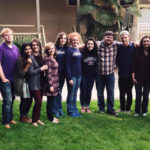• The BaptistWay lesson for Aug. 31 focuses on Isaiah 6:1-8 and Revelation 4:1-11.
While in seminary, I had a mentor who led his church to begin a contemporary worship service. He was ecstatic when the vote passed to move Sunday school up 90 minutes to fit between the traditional service at 8 a.m. and what would take shape as the contemporary service at 11 a.m. He was even more thrilled when the contemporary service launched and university students flocked to it. At first, the church assumed those attending the contemporary service were students who previously attended what had now become the traditional service.
What the church found over time, however, was that many of these young students were not members of the church at all. My mentor, in effect, had created two congregations that met in the same church building. He has since left the church, and interestingly, the church now is discussing going back to one service.
Defining worship
The lesson I’ve taken from this scenario is the reminder that the format of our worship makes a statement. We may not always be aware of the statement it is making, and it might even make an unintended statement, but the fact remains all the same. Too often, we simply equate the subject of worship in our Baptist churches to music. While music can and should be a huge part of worship, all music is not necessarily worship, and worship certainly is not all music.
Terry York, associate professor of Christian ministry and church music at George W. Truett Theological Seminary, believes worship is something that needs to be thought about in a way that transcends the discussion concerning musical style and preference and enters into the realm of theology. “Theology and worship cannot be separated. Theology informs worship, and in the same way, worship informs theology. It’s a circular thing in which both are present. You can’t say you have one particular theology, and then worship in another way,” York said.
So, instead of focusing on worship as a particular style, let us focus on worship as an expression of what we believe about God. After all, that is the way the Bible speaks about it.
Worship on Earth (Isaiah 6:1-8)
When Isaiah is given his commission through a vision of God “seated on a throne” (v. 1), he is overwhelmed with what he encounters. The first hymn in most hymnals, “Holy, Holy, Holy,” echoes the cries of the angels he saw worshipping God in their magnificent splendor. His response is one of humility and shame at his and his people’s sin. While we do not have a vision like this to motivate us, an awareness of God’s holiness, majesty and supreme rule should serve as a catalyst as we seek to worship him on earth. We need to remember the call Isaiah received came specifically as a result of a lack of true worship among God’s people. In 1:11, Isaiah rebukes them harshly: “‘The multitude of your sacrifices—what are they to me?’ says the Lord. ‘I have more than enough of burnt offerings, of rams and the fat of fattened animals; I have no pleasure in the blood of bulls and lambs and goats.’”
Sign up for our weekly edition and get all our headlines in your inbox on Thursdays
The redemptive part of Isaiah’s vision comes from the forgiveness he receives resulting from his humility before God (v. 6). It is only after Isaiah has humbled himself in true worship and received forgiveness from God that he can respond with those famous words: “Here am I. Send me!” (v. 8).
How we worship on earth is not nearly as important as whom we worship. When it is done in any other way or for any other reason—regardless of the number of people involved or how attractive the music or setting might be—it falls short of genuine, life-changing worship.
Worship in heaven (Revelation 4:1-11)
According to a vision in Revelation 4, worship in heaven will look very similar to the vision Isaiah received many years ago. The familiar “Holy, holy, holy” refrain is again found on the lips of imagination-defying creatures. However, John takes the scene a step farther. He describes not only the worship of God by angels (what he refers to as “creatures” in v. 8), but also 24 elders that likely represent the church bowing down and proclaiming: “You are worthy, our Lord and God, to receive glory and honor and power, for you created all things, and by your will they were created and have their being” (v. 11).
Finally, we have a perfect picture of God’s people responding just as they should. They aren’t worshipping in response to hearing a certain kind of music, being influenced by the personality of a flamboyant preacher, or because they hope it will better their reputation before others in the community. They simply are worshipping God because of who he is.
Worship starts with God. To the best of our ability, let us strive to make that our starting place for worship on earth, as we anticipate the holy and perfect worship of heaven.














We seek to connect God’s story and God’s people around the world. To learn more about God’s story, click here.
Send comments and feedback to Eric Black, our editor. For comments to be published, please specify “letter to the editor.” Maximum length for publication is 300 words.